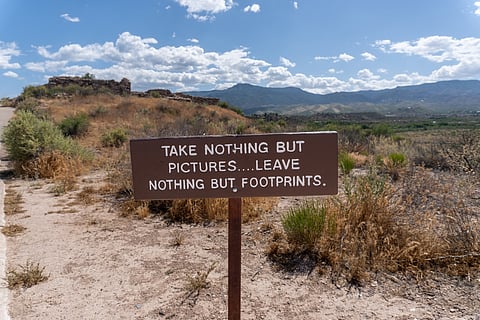
- Destinations
- Experiences
- Stay
- What's new
- Celebrating People
- Responsible Tourism
- CampaignsCampaigns
- SubscribeSubscribe
- Buy Now

Sustainable tourism has become a buzzword in the travel industry, with many claiming to champion it—though not all walk the talk. But what does it really mean? At its core, sustainable tourism is about travelling in ways that reduce environmental harm, respect local cultures, and support community economies. It’s not limited to eco-resorts or banning plastic; it’s a broader commitment to managing resources responsibly, so tourism benefits both visitors and host communities—now and in the future. With World Tourism Day around the corner, it’s a timely moment to cut through the noise and rethink what sustainability in travel truly looks like.
It’s not just about eco-lodges or plastic-free travel, but about responsible resource management that benefits both present and future generations. In this piece, we take a closer look at what sustainable tourism truly involves—and debunk the myths surrounding it. Because not everyone who claims to be sustainable is walking the talk.
A common misconception is that sustainable tourism means giving things up—fewer comforts, less fun, or rigid rules. In reality, it often opens up richer, more meaningful ways to experience a place. By engaging with local communities, respecting traditions, and choosing smaller, locally run businesses, travellers are more likely to discover stories, flavours, and places that mainstream tourism tends to ignore. Whether it’s sharing a home-cooked meal, learning a traditional craft, or exploring a lesser-known trail, sustainable tourism invites you to connect more deeply with the destination—not just see it from a distance. Rather than restricting your journey, it adds layers of authenticity and insight.
It’s easy to feel that in the face of climate change, over-tourism, and cultural exploitation, a single traveller’s actions are too small to count. But in reality, the opposite is true. Every decision you make—whether it's choosing a homestay over a chain hotel, dining at a locally owned café, refusing plastic, or respecting local customs—contributes to shaping the future of travel. When enough individuals make conscious choices, the ripple effect is powerful. It encourages local economies to thrive, reduces environmental pressure, and helps preserve cultural heritage. Businesses notice what travellers support and begin to shift their practices in response. So while you may be one person, your journey doesn’t happen in isolation. With each trip, you help set a precedent—that mindful, responsible tourism is not only possible, but necessary.
It’s a common assumption that sustainable travel is synonymous with high-end experiences. While those options do exist, sustainable tourism is not defined by cost—it’s defined by conscious choices. You can travel responsibly on any budget by supporting local businesses, staying in homestays or guesthouses, using public transport, and reducing your waste. In fact, many sustainable practices like eating locally, avoiding over-touristed hotspots, or choosing slower, more mindful travel often end up being more affordable. It’s less about spending more and more about thinking differently. Being a responsible traveller isn’t about how much you pay, it’s about the impact you leave behind.
Not all “green” claims are what they seem — and many are just clever marketing. In recent years, the rise in eco-conscious travellers has led to a boom in “eco-friendly” branding across the tourism industry. But not all of these claims are genuine. This phenomenon, known as greenwashing, involves businesses using environmental buzzwords like “sustainable,” “eco,” or “green” to attract customers — while making minimal or purely superficial efforts to reduce their impact. A hotel might ask guests to reuse towels or use paper straws, but still rely on fossil fuels, produce large volumes of waste, or offer no support to the local economy. That’s why it’s important to look beyond the labels. Look for transparency in how the business operates. Does it employ locals? Source food nearby? Invest in conservation or cultural preservation? True sustainability goes far deeper than marketing slogans.
It applies everywhere and goes far beyond just protecting the environment. You can travel sustainably while staying in a city hotel, visiting museums, or dining at a local café. Needless to say, environmental conservation is a key pillar—but it’s not the only one. True sustainability also means supporting local communities, preserving cultural heritage, and ensuring economic benefits are fairly shared. It’s about choosing experiences and services that value people as much as the planet—from fair wages and ethical sourcing to respectful engagement with local traditions. Whether in a remote village or a global capital, sustainable tourism is about making conscious, informed decisions that leave a positive impact.
What exactly is sustainable tourism?
Sustainable tourism is about travelling in ways that minimise environmental harm, respect local cultures, and support the economic well-being of host communities. It aims to ensure that tourism remains viable and beneficial for both present and future generations.
Is sustainable travel only about protecting nature?
Not at all. While environmental conservation is a key part, sustainable tourism also involves preserving cultural heritage, ensuring fair wages, supporting local economies, and empowering communities.
Is sustainable tourism only for backpackers or nature lovers?
No. You can travel sustainably in cities, luxury hotels, beach resorts, or remote villages. It's more about your choices—supporting local, reducing waste, and respecting the place you visit—than where you go or how much you spend.
Is it more expensive to travel sustainably?
Many eco-conscious choices—like using public transport, eating at local places, or staying in homestays—are often budget-friendly alternatives to mass tourism.
How can I tell if a hotel or tour is truly eco-friendly?
Look beyond marketing buzzwords like “green” or “eco.” Check for credible certifications such as those from the Global Sustainable Tourism Council (GSTC) or see if the business actively supports local communities and conservation efforts.
Can I still enjoy comfort while travelling sustainably?
Yes. Sustainable tourism is not about giving up comfort—it’s about making mindful choices. You can stay in comfortable accommodations, enjoy great food, and have enriching experiences while also being responsible and respectful.
